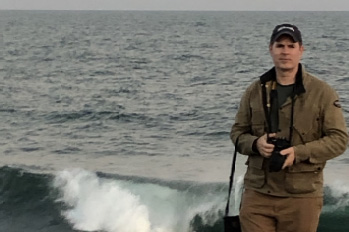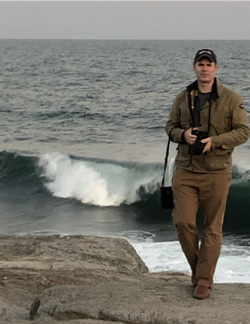Dickinson College
Striving for Safer Skies

Neil Morgan

Neil Morgan.
Can you speak to how Dickinson’s useful liberal-arts education helped you along your career path?
While filling my head with international relations, history, biology, music, German, economics and cosmology, I was also building interpersonal and managerial skills through extracurriculars (Campus Activities Board, Student Senate, Jazz Ensemble and others). The ability to quickly learn a new subject and confidently apply the knowledge has served me well, especially in federal government contracting. Projects have lasted three weeks to six years. They have involved financial software, real estate, aircraft maintenance, cloud computing, border security and small business loans. Leading the teams that do this work, speaking confidently about the subject matter and representing my company to the customer all tap directly back to what I learned at Dickinson.
At one of many crossroads in my career, a supervisor told me, “You’re a generalist. You need to become an expert in something so people will know what you do.” I knew they meant well, but I have always relied on a liberal-arts approach to my career: Be a flexible fit for almost any situation, lead people and teams with positivity and bridge gaps with clear communication.
What was your favorite activity/organization at Dickinson?
Serving on the leadership team of the Campus Activities Board (CAB) provided me with my first “professional” management role. I have no idea if we were supposed to have that much autonomy, but our group put on some of the most incredible entertainment productions, from a basic stand-up comedian to a full-blown acrobat team from China (and Coffeehouse every Thursday). As a team, we handled almost all aspects of the events: artist relations, finances, sound/lighting, staff management, catering and all the night-of-show glitches.
How has Dickinson’s focus on global education impacted your life or career since graduation?
Though I graduated an international studies major with a semester abroad under my belt (as well as some classes on the music and culture of India), I did not end up as the international businessman I imagined when I first arrived in Carlisle. No matter. My Dickinson experience imbued me with knowledge of world history, culture, economics, negotiations and why organizations succeed and fail. The variety of courses and professors helped me process this information with a sensitivity to what’s possible. One class’s first requirement was to read The Economist magazine every week. The lesson stuck: if you want to know how you’re performing, ask someone who has observed you from the outside. Put yourself in their shoes and look back. I find it’s still the best way to work with others and manage my career.
How did your study abroad experience affect you?
I studied in Freiburg, Germany, the first semester of my junior year. Culture shock hit me the first few days after the adrenaline of arrival wore off. It showed that my four semesters of German classes were better suited to reading Thomas Mann and Günter Grass than to navigating the country and conversing with locals. However, as I would later learn at my first post-college job (where another kind of culture shock struck), stick-to-it-iveness builds adaptation. It helps you find the groove where you fit. In Europe, the classes I took, the friends that I made and the adventures we had were a big part of that groove. Yes, I was excited to get back to Carlisle but sad to leave Freiburg. I still stay in touch with the friends I made there.
What jumps out as a great memory from your time at Dickinson?
In spring of my senior year, music Professor Emeritus Truman Bullard pushed me to join the Dickinson College Choir for the big performance of Verdi’s “Requiem” with the Harrisburg Symphony. During rehearsals, I sang next to College Treasurer Michael Britton, someone I doubt I would ever have otherwise met. He took an interest in my post-college job search and recommended I send a resume to a company he knew. I went on to have two rounds of interviews with that firm, including one at their headquarters. I didn’t get the job, but it was an incredibly valuable experience. That confluence of generosity from the Dickinson professor and the Dickinson administrator toward me, the Dickinson student, (facilitated by a college-community event) embodies everything that is great about a small liberal-arts institution.
How do you stay involved with Dickinson?
Dickinson does an outstanding job keeping me up to date with the magazine and regular emails. I also haven’t missed a reunion since graduating. Being back on campus and seeing what’s new refreshes all the influences from my time there. Dickinson College is the education, the place, the experience and the people. I’m lucky that the friends I made at Dickinson are still the best ones I have. That’s the most important way I stay involved.
How did you get interested in your work, and what about it excites you most?
Frankly, I stumbled into government IT and management consulting. I needed a new job and had no idea what it would look like. During my search, I connected my experience in real estate data to a contract that focused on federal building leases, and it all took off from there. Since then, I’ve worked on a variety of projects at different agencies in diverse roles, such as leading the teams that process federal real estate bills, coordinating the training for a financial software rollout, researching the burgeoning cloud and DevOps industry, writing custom project management guides, managing the mainframe that processed SBA loans, starting a Maximo asset management application support team at DHS and now implementing an aircraft maintenance and logistics system. This kind of variety—and serving as a bridge between the technical and the business sides—is what excites me most. Plus, I’ve gotten to travel all over the country, and now I get to talk about helicopters and airplanes all day.
What does your current work entail?
I lead projects for the implementation of a new maintenance and logistics management system for the largest law enforcement air force in the world. The new system, called Maximo for Aviation, will replace a set of programs the government has been using for almost 30 years. It tracks the inspections and repair work for the fleet, spare parts, fuel, purchasing and operating costs. After I assembled the team and established the project plan, we crisscrossed the nation to learn how the organization manages their nearly 200 helicopters and fixed-wing aircraft. This involved interviewing mechanics, supply technicians, financial personnel and executives to understand their daily activities and what they need from the new system. With my resulting writeups, the technical team customized the new software, and we are now on the path to launch. I am now creating internal and user-focused testing plans, a COVID-driven virtual training program for 800 users and the approach to go-live. The quality and accuracy of my team’s work is critical: What we do every day is connected to the safety of the aircraft and all who fly in them as well as the success of the missions those aircraft fly.
What comes to mind as something unforgettable that you’ve done since you graduated?
In 2005, I flew to Glasgow, Scotland, rented a motorcycle, and rode around the Highlands by myself for eight often cold and wet days. I was a novice rider and didn’t tell anyone I was going, but it was the right time for an adventure. Traveling somewhere new, doing something exciting, taking a risk or experiencing another culture always makes me feel like my life is a success. After 52,000 miles of touring on two wheels on two continents, Scotland is still unforgettable.
Published October 20, 2020